Your Cart is Empty
Add description, images, menus and links to your mega menu
A column with no settings can be used as a spacer
Link to your collections, sales and even external links
Add up to five columns
Add description, images, menus and links to your mega menu
A column with no settings can be used as a spacer
Link to your collections, sales and even external links
Add up to five columns

How to make sugar shift probiotic yogurt
Barb Hodgens
Barb Hodgens loves to cook with alternative, healthy whole food ingredients, with a focus on gut health. Barb has overcome her own gut health issues through healthy eating. Share your ideas, comments and photos at the end of this post :)

Homemade yogurt that targets the way the body metabolises sugar.
We’re excited to introduce our yogurt loving community to a new probiotic starter culture called ‘Sugar Shift’ by Martha Carlin of Biotiquest. The original Sugar Shift probiotic was created to target the way the body metabolises sugars. The formula converts excess sugars (glucose and fructose) into mannitol, which the human body naturally eliminates. Converting these sugars re-establishes harmony in the gut and helps speed up sugar metabolism.
Whether you’re struggling with a specific health challenge, or you simply want to feel your best, ‘Sugar Shift’ probiotic yogurt can:
- Reduce inflammation and other complications by altering sugar metabolism.
- Improve bowel regularity.
- Decrease sugar and carb cravings often leading to weight loss.
- Boosts energy and lessen fatigue.
- Restore overall digestive health.
- Improve glucose metabolism by reducing levels of blood glucose.
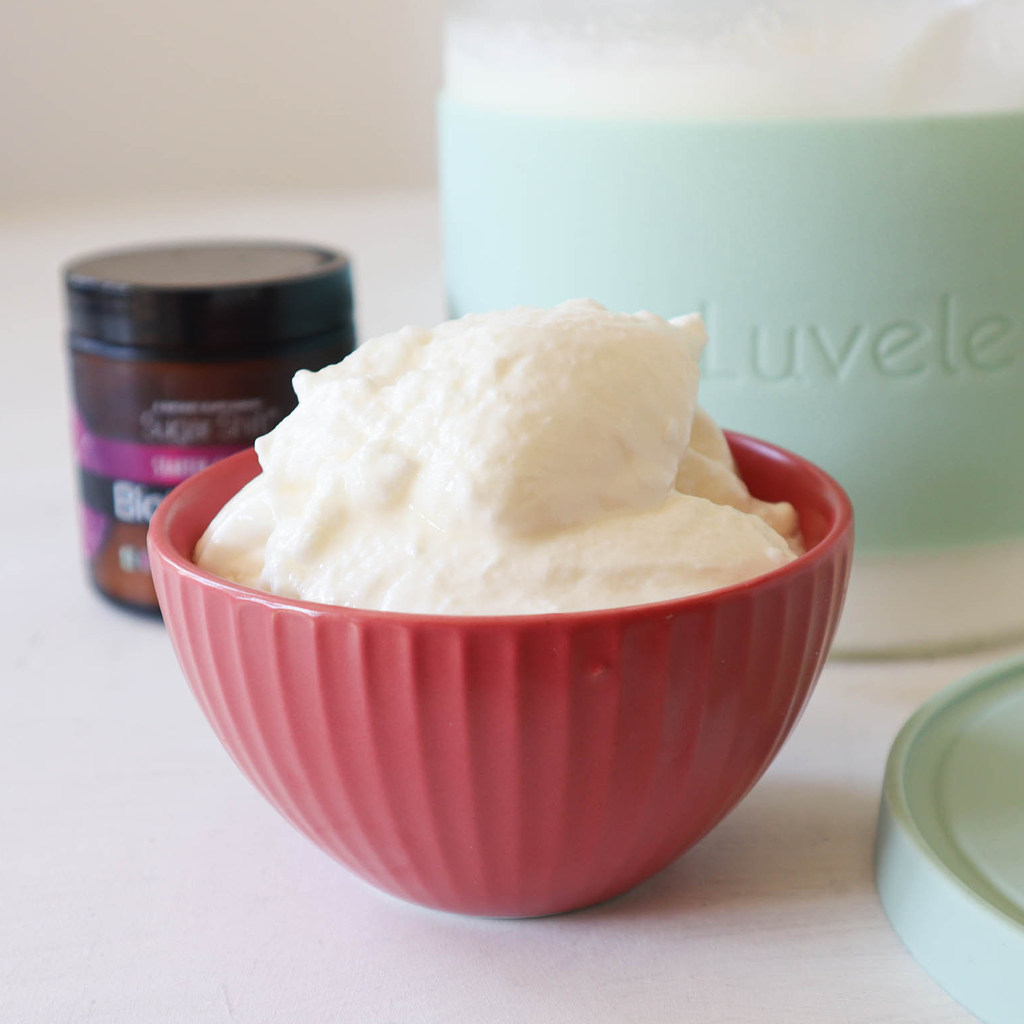
THE STARTER CULTURE
The unique eight-strain formula was designed to tackle the growing problem of sugar addiction and its impact on the microbiome. The formula is a well-balanced, very specific community of bacteria that includes L. reuteri, the key strain Dr. Davis recommends for gut health. Unlike conventional yogurt making, Davis's method maximises bacterial counts by adding prebiotic fibre to the yogurt mixture before fermentation to provide additional food for the microorganisms. Good news, the unique Sugar Shift blend contains inulin so you will not have to add prebiotic fibre to the milk separately when you make your yogurt.
Sugar Shift starter is best fermented at a low temperature for up to 36 hours. According to lab tests, when the conditions are right during fermentation the bacteria in Sugar Shift double every 12 hours. The long fermentation process generates very high probiotic bacterial counts, far higher than any store-bought or traditional homemade yogurt.

WHICH MILK TO USE
The original Biotiquest method uses ultra-pasteurized half and half milk, which is a full-fat milk commonly available in America. It is not available in Australia, in the UK and Europe, it’s known as ‘half cream’. If half and half milk is available in your area, we recommend you use it. Where half and half milk is not available, we recommend heating full cream milk (or ‘whole milk’ in America and Canada). Heating changes the milks composition, eliminates competing bacteria, and will prevent it from separating into curds and whey. Furthermore, heating and holding the temperature at 82° C (180° F) for 10-20 minutes denatures the milk proteins so that they bind and set together producing a thicker and creamier final product. Let the milk cool down to below 42° C (107° F) before adding the starter.
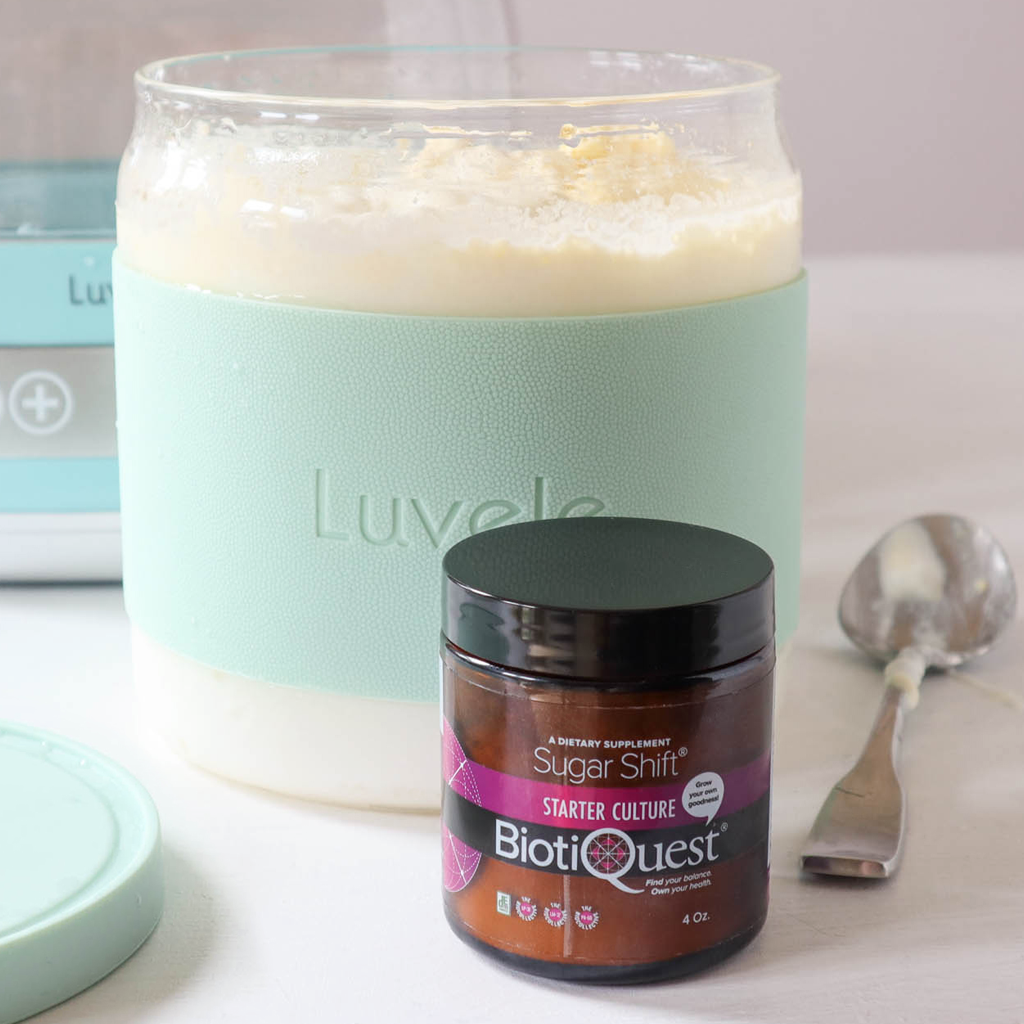
WHAT TO EXPECT
Thin or separated yogurt is common with probiotic strains. To yield a thicker Greek-style result you can pour off or strain the whey following this method. Whey is often dubbed ‘liquid gold’. It's highly nutritious and can be used in a variety of health-giving ways. Adding it into smoothies is a delicious way to get a probiotic boost.
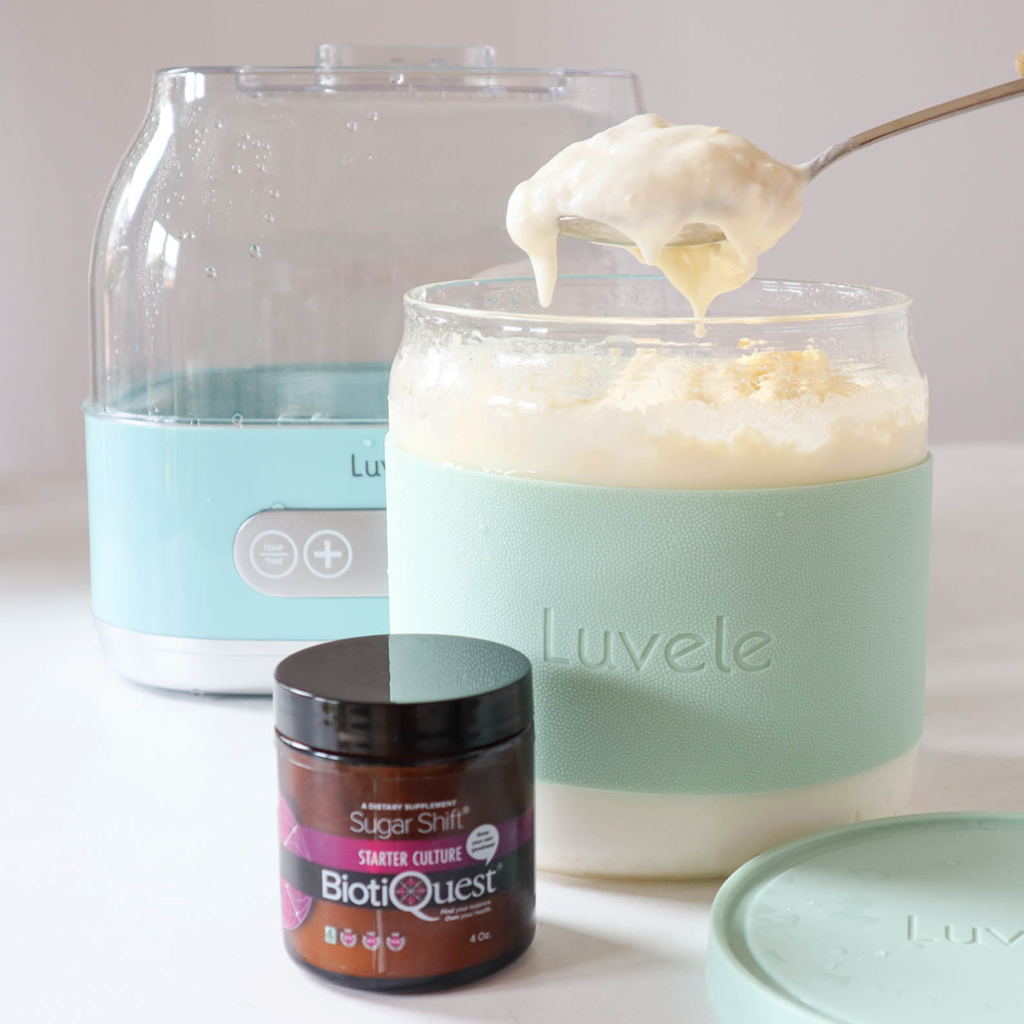
PREPARATION
Before you begin it is important to sterilise the Luvele yogurt making glass jar and any utensils you use, in boiling hot water. Do this by boiling a kettle and carefully pouring the hot water in the jar and over the equipment. The danger of not sterilising is that other bacteria may overpower your culture and affect the quality of your ferment.
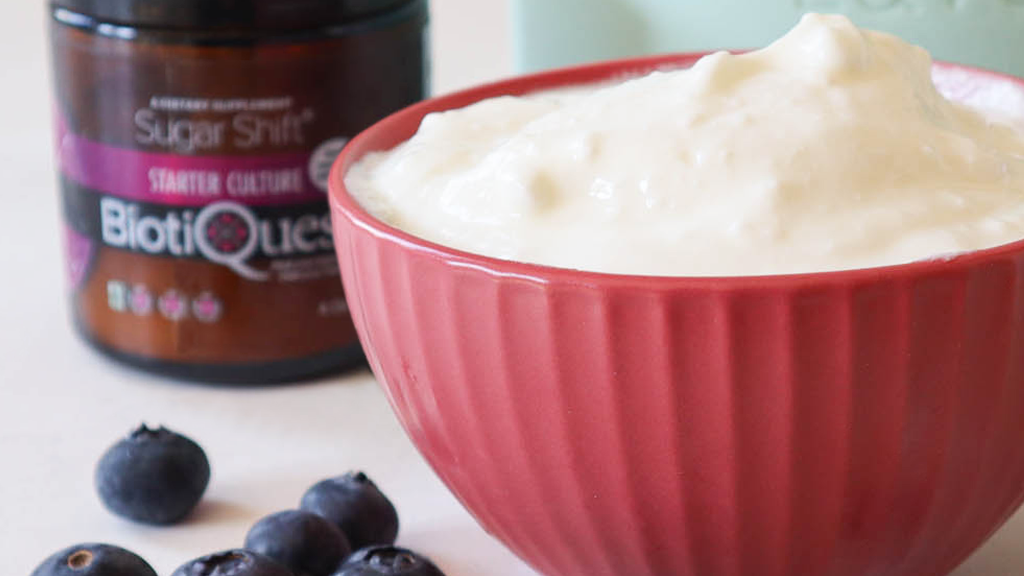
How to make sugar shift probiotic yogurt
Luvele
Rated 2.6 stars by 14 users
Whether you’re struggling with a specific health challenge, or you simply want to feel your best, ‘Sugar Shift’ probiotic yogurt can, reduce inflammation, improve bowel regularity, decrease sugar and carb cravings, boost energy, restore digestive health and improve glucose metabolism by reducing levels of blood glucose.
Ingredients
-
2 litres whole milk (full cream) or half and half
-
1 scoop of Sugar Shift starter culture
Directions
If you would like to denature the milk start by heating the milk. If you are using half and half or UHT milk move to step 4.
Pour the milk into a large clean saucepan. Place the saucepan on the stove top and heat to 82° C (180° F) Use a thermometer for an accurate reading. Hold the milk at this temperature for 10-20 minutes. It can be a challenge to hold the milk at a high temperature for so long. We recommend using a double boiler pot filled with boiling water. Don’t get too caught up on the precise temperature. If the milk accidentally boils briefly, don’t panic – reduce the heat and continue.
Remove from the stove and let cool to below 42° C (107° F). You can actively cool it by filling a sink, or bowl with cold water and ice cubes and setting the pot of heated milk in the cold water. It is fine if the milk cools down below 42° or even goes cold, it just mustn't be hot. Temperatures above 43° C will kill the starter culture. As the milk cools, a layer of skin will form on the top. There is no harm leaving it in. It does not produce lumpy yogurt.
Pour the milk into the glass yogurt making jar.
Add one scoop of the starter culture and thoroughly whisk it in.
Put the lid on the yogurt making jar and place into the yogurt maker. Pour water slowly into the base. The water must not be filled over the ‘tall line’ indicated on the inside wall of the maker. Place the cover lid on top.
The milk is now ready to begin fermentation. Use the digital control panel to set the temperature to 36°C/96°F and the time to 36-hours and then press ‘confirm’ to begin incubation. If you have an older version Luvele yogurt maker set the timer to 24-hours and then when that is complete, set the maker for a further 12-hours.
Condensation will have collected under the cover lid during fermentation. Take care removing it and allow the water to drip into the water bath, instead of your bench. Switch the yogurt maker off and remove the yogurt jar. Straight from the maker Sugar Shift cultured dairy will be warm. Do not stir it while it is warm. Depending on the milk you used, your yogurt may have a thin layer of cream on top.
Place the yogurt in the fridge for at least 6 hours to set, then enjoy.
Recipe Video

PIN THIS RECIPE
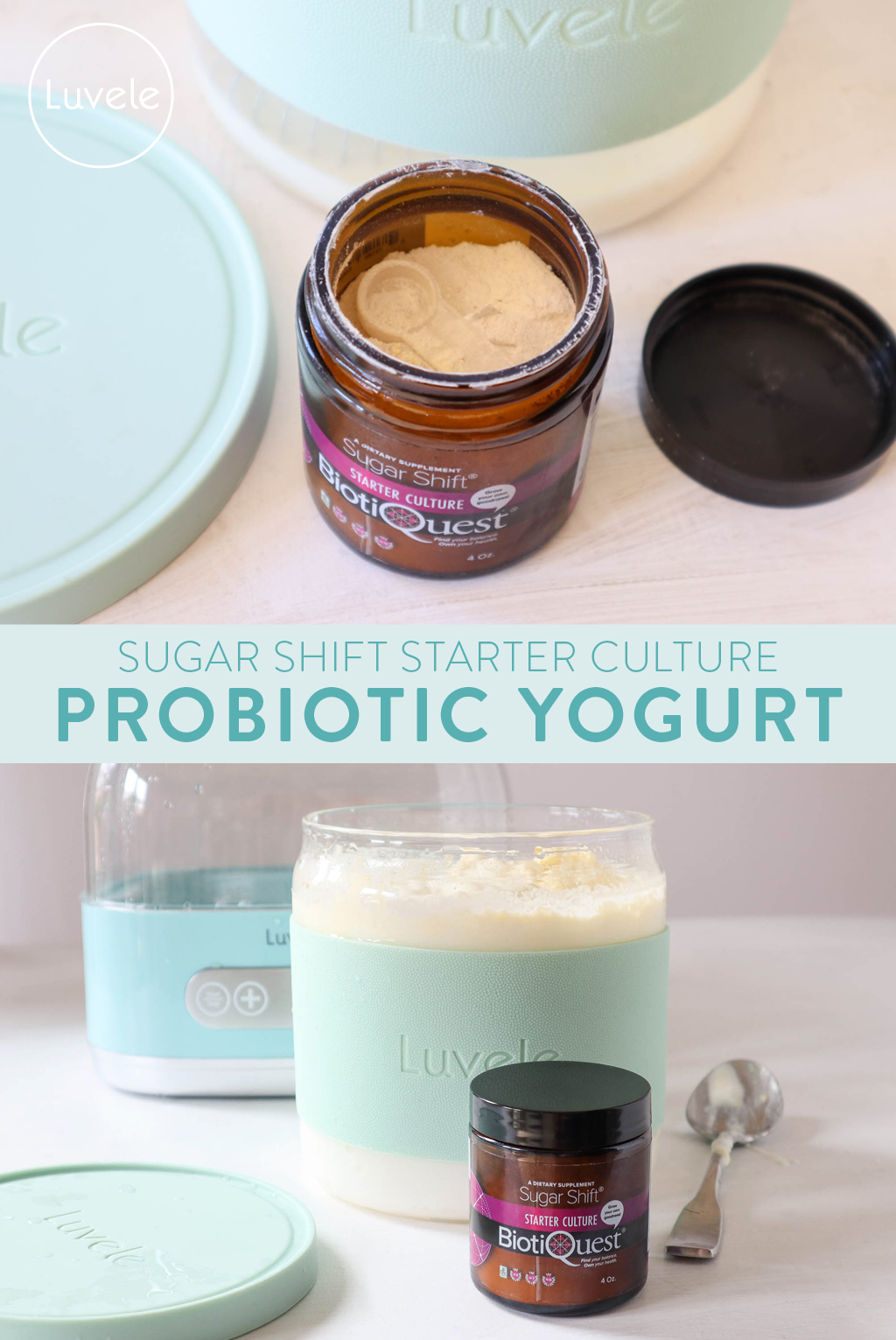

How to make sugar shift probiotic yogurt

Homemade yogurt that targets the way the body metabolises sugar.
We’re excited to introduce our yogurt loving community to a new probiotic starter culture called ‘Sugar Shift’ by Martha Carlin of Biotiquest. The original Sugar Shift probiotic was created to target the way the body metabolises sugars. The formula converts excess sugars (glucose and fructose) into mannitol, which the human body naturally eliminates. Converting these sugars re-establishes harmony in the gut and helps speed up sugar metabolism.
Whether you’re struggling with a specific health challenge, or you simply want to feel your best, ‘Sugar Shift’ probiotic yogurt can:
- Reduce inflammation and other complications by altering sugar metabolism.
- Improve bowel regularity.
- Decrease sugar and carb cravings often leading to weight loss.
- Boosts energy and lessen fatigue.
- Restore overall digestive health.
- Improve glucose metabolism by reducing levels of blood glucose.

THE STARTER CULTURE
The unique eight-strain formula was designed to tackle the growing problem of sugar addiction and its impact on the microbiome. The formula is a well-balanced, very specific community of bacteria that includes L. reuteri, the key strain Dr. Davis recommends for gut health. Unlike conventional yogurt making, Davis's method maximises bacterial counts by adding prebiotic fibre to the yogurt mixture before fermentation to provide additional food for the microorganisms. Good news, the unique Sugar Shift blend contains inulin so you will not have to add prebiotic fibre to the milk separately when you make your yogurt.
Sugar Shift starter is best fermented at a low temperature for up to 36 hours. According to lab tests, when the conditions are right during fermentation the bacteria in Sugar Shift double every 12 hours. The long fermentation process generates very high probiotic bacterial counts, far higher than any store-bought or traditional homemade yogurt.

WHICH MILK TO USE
The original Biotiquest method uses ultra-pasteurized half and half milk, which is a full-fat milk commonly available in America. It is not available in Australia, in the UK and Europe, it’s known as ‘half cream’. If half and half milk is available in your area, we recommend you use it. Where half and half milk is not available, we recommend heating full cream milk (or ‘whole milk’ in America and Canada). Heating changes the milks composition, eliminates competing bacteria, and will prevent it from separating into curds and whey. Furthermore, heating and holding the temperature at 82° C (180° F) for 10-20 minutes denatures the milk proteins so that they bind and set together producing a thicker and creamier final product. Let the milk cool down to below 42° C (107° F) before adding the starter.

WHAT TO EXPECT
Thin or separated yogurt is common with probiotic strains. To yield a thicker Greek-style result you can pour off or strain the whey following this method. Whey is often dubbed ‘liquid gold’. It's highly nutritious and can be used in a variety of health-giving ways. Adding it into smoothies is a delicious way to get a probiotic boost.

PREPARATION
Before you begin it is important to sterilise the Luvele yogurt making glass jar and any utensils you use, in boiling hot water. Do this by boiling a kettle and carefully pouring the hot water in the jar and over the equipment. The danger of not sterilising is that other bacteria may overpower your culture and affect the quality of your ferment.
:recipekit:

PIN THIS RECIPE


Subscribe
Sign up to get weekly healthy recipes & information on new product releases.
Item is added to cart



